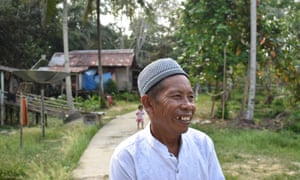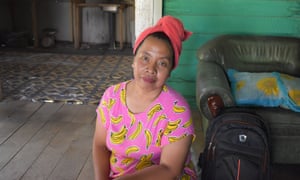Sugio’s orchard is his life’s work and a great source of pride for the 79-year-old resident of Tengin Baru village in Indonesia’s East Kalimantan. The orchard sits back from the main road, which in places is no more than a potholed track that cuts through jungles and villages. The plot of land is tranquil and filled with birdsong.
For 42 years Sugio has cultivated his hectare, diligently planting a variety of colourful fruits and vegetables. He points out corn, durian, rambutan, pepper and sweet potato plots; ducks and chickens wander around in the afternoon sun. “We have everything we need here,” he says. “Our family can’t even eat everything before it spoils, so we sell it at the market. Our life is already perfect.”
But he worries it might not be perfect much longer. The future of Sugio’s farm is under threat because it sits on land that has been earmarked for the site of Indonesia’s new capital, which is set to be moved from Jakarta to the sparsely-populated regencies of Kutai Kartanegara and Penajam Paser Utara on the island of Borneo.

Indonesia’s president, Joko “Jokowi” Widodo, formally announced the planned move on 16 August during his state of the union speech one day before Indonesia’s 74th anniversary of independence. Explaining the rationale, Jokowi said that, “A capital city is not just a symbol of national identity, but also a representation of the progress of the nation. This is for the realisation of economic equality and justice.”
The move comes amid dire predictions for the future of Jakarta – home to 30 million people – which is sinking due to unregulated groundwater extraction and prone to widespread flooding and congestion.
The logic of the plan, first mooted nearly 70 years ago, is also to escape Java’s earthquake risk and copy the good management of Seoul, the greenness of Singapore and Washington’s separation of administration from business.
If parliament approves the project, approximately 1.5 million people will move to the new capital in East Kalimantan at an estimated cost of 466 trillion rupiah ($32.7bn). A new government framework is expected to be set up on site by 2024 when the president finishes his second and final term in office. Jakarta will continue to be a commercial and financial centre, and the majority of its nearly 10 million residents are likely to stay.
But the proposed move is already causing concern amongst local residents in East Kalimantan including Sugio’s niece, Wiwit. “I saw the announcement about the new capital on TV and I was so shocked,” she said. “What will become of people like us? If they bulldoze our homes to build a new capital, where will we go?”
Sugio and his family were resettled in East Kalimantan as part of former president Suharto’s transmigration program in the 1970s. In an effort to encourage residents to move from densely populated areas to less crowded parts of the country, families were relocated from Java to other locations across the archipelago including Kalimantan. Sugio made the move from Banyuwangi in East Java in 1977. The government gave each family of parcel of land measuring one hectare and Wiwit points out the absurdity of the government now taking back this land to make room for the new capital. “This is our home,” she said. “This is my birthplace. We have brought up our children and grandchildren here. We don’t want to leave and we will fight if we have to.”
Asked if there were any possible positive aspects to the proposed relocation of the capital, Wiwit, who owns a small stall selling mixed rice dishes, said that she will open a larger restaurant to help feed the new government workers who will move to East Kalimantan from Jakarta.
Other residents also have concerns about the move. Jubaen, 53, is the cultural chief of Pemaluan, a village inside the planned capital zone, and a member of the indigenous Paser Balik tribe. “In town people will kill their best friends, but here we have a strong sense of community. If we have to move, all of that will be lost,” he said.

Jubaen says he witnessed the destruction of surrounding areas by logging and mining companies firsthand over the years, and fear that the new capital will make things even worse. “When I was younger we could go into the nearby forest and collect honey and fruit, but then the area was taken over by ITCI,” said Jubaen.
ITCI, or the International Timber Corporation, is a logging company owned by Hashim Djojohadikusumo, the brother of former presidential hopeful Prabowo Subianto who was defeated by Jokowi in the election in April 2019. Much of the land in the new capital zone is owned by coal mines, palm oil plantations and logging companies. These companies are expected to profit by selling their land back to the government to make way for the new capital.
Experts have warned that the new capital is an environmental crisis waiting to happen. Bernaulus Saragih, a lecturer in the forestry department at Mulawarman University in Samarinda, East Kalimantan, tells the Guardian the effect on the environment will be massive. “There will be changes in the water systems and environmental drainage, as well as forest encroachment.”
He said forests in the region are home to endangered orangutans that and Balikpapan Bay, which will become the local port, is a habitat for endangered dugong.

The government has pledged there will be no building in protected forest and says it plans to reforest abandoned mines and illegal palm oil plantations.
This week planning minister Brodjonegoro floated the idea of an orangutan conservation centre similar to one for giant pandas in the Chinese city of Chengdu. The Guardian contacted the Indonesian government for comment, but did not get a response.
Conservationists remain unconvinced that there would be no spillover effects from moving the capital.
Like many other residents, Yustinus Sapto, a local environmental researcher and activist based in Samarinda, is critical of the proposed move, pointing out that the region needs to fix its environmental problems caused by mining and logging companies first.
“Most of East Kalimantan’s orangutans are in rehabilitation centres now,” he says. “They are meant to live in the forest canopy, but due to logging and other environmental damage, the trees are now further apart and they can’t swing from one to another.”
As a result, the orangutans have to descend to the forest floor leaving them vulnerable to predators and where they grow weak from lack of exercise, he says. In recent years this has caused problems for rehabilitation centres that aim to release injured animals back into the wild once they have been rehabilitated, but increasingly struggle to find safe places to do so.
“We need to preserve and restore the ecosystem in East Kalimantan,” he says. “If you ask an environmental expert how to do that, their answer will be that it’s easy. Just rip up all the buildings and let it return to nature – the opposite of building a new capital.”
“In East Kalimantan we’re not scared of things like terrorism, “ he adds. “We’re scared of cement.”




